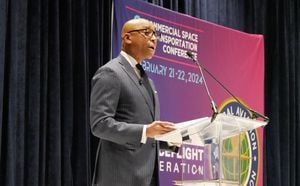Boohoo, the British online fast-fashion retailer, is at the center of some intriguing corporate maneuvering amid its struggle to stabilize its business operations. Recently, the company extended an offer for its largest shareholder, Frasers Group, to have a seat on its board. But there's one big catch: the placement of Mike Ashley, the founder of Frasers, or restructuring specialist Mike Lennon, is off the table. This development has sparked considerable dialogue, highlighting the complex relationships within the vibrant yet tumultuous retail sector.
The tension between the two parties stems from Frasers Group's desire for representation on the Boohoo board, which boils down to the influence Ashley and Lennon could wield. Boohoo's refusal to endorse either candidate is largely framed around concerns of potential conflicts of interest characterizing their close ties to Frasers. Boohoo's board made it abundantly clear, stating it would not enter discussions about appointing either Ashley or Lennon under any circumstances. This reflects broader fears of how their presence could undermine the authority of Boohoo’s executive vice chair, Mahmud Kamani.
According to reports, the friction reached new heights following Frasers Group's open letter demanding representation on Boohoo's board. The frustrations are palpable; Boohoo's leadership insists Ashley and Lennon are unsuitable candidates, embroiled as they are with interests conflicting with Boohoo’s directive. Tim Morris, Boohoo's chair, expressed this sentiment, stating, "These are key issues which need to be addressed for the protection of all shareholders, and it is not for Frasers to pick and choose which commitments it will give."
To complicate matters, Frasers Group recently argued Boohoo’s opposition to Ashley and Lennon is evidence of the retailer’s wish to maintain Kamani’s influence. The justification implies concerns about how effectively Ashley could implement substantial changes if appointed, ostensibly to bolster Boohoo’s current operational strategy, which has faced significant hurdles. These include declining earnings and market share due to broader industry challenges and post-pandemic shifts.
Ashley, who has been vocal about his ambitions for Boohoo, has not held back criticism of Kamani and Boohoo’s board strategy. He has depicted Kamani as having “an unhealthy grip on the board” and has claimed Boohoo is suffering from mismanagement. Meanwhile, shareholder advisory groups like Glass Lewis and Institutional Shareholder Services have publicly sided with Boohoo. They recognize the potential risks associated with appointing individuals with close ties to Frasers, emphasizing the necessity for Boohoo governance to remain untangled from external influences.
Despite these substantial tensions, Boohoo remains open to collaboration. It has proposed potentially offering one board seat to Frasers—provided the firm nominates someone who does not present conflicts of interest. This willingness hints at recognition of Frasers’ 28% stake, which is significant enough to warrant consideration for board representation under the right conditions.
The upcoming general meeting, set for December 20, will be pivotal. Shareholders will confront the issues raised around governance and strategic direction, pressed by both company representatives and external advisors. It stands as Boohoo's opportunity to showcase its commitment to protecting minority shareholders, especially against Frasers’ perceived dictates.
Frasers Group has signaled willingness to negotiate terms, asserting Ashley and Lennon will adhere to standard governance protocols, leveling the field as strategic partners rather than adversaries. They argue the contributions from seasoned veterans like Ashley could provide much-needed navigation through the choppy waters of retail recovery.
On the financial front, Boohoo has been grappling with declining revenues and profitability. This predicament means the stakes are high, and pressure is mounting for substantive solutions to revive the brand. The company has recently appointed Dan Finley, former chief of Debenhams, as CEO to help spearhead this recovery. His appointment brought significant hope, yet it has not entirely softened the insistence for boardroom changes from Frasers.
Overall, the battle for boardroom influence between Boohoo and Frasers Group exemplifies the often heated interplay of interests within the retail sector. At its core, it raises pressing questions about leadership, governance, and corporate strategy—topics of great interest to investors and analysts alike.
Looking beyond personal rivalries, the event serves as a point of reflection on corporate governance standards, highlighting the tumultuous path companies must navigate to align interests of various stakeholders effectively.
While it remains uncertain how the meeting will conclude, one takeaway is clear: the dynamics of influence within the retail space are far from straightforward, and as Frasers and Boohoo prepare to engage, the outcome could resonate throughout the industry.
This duel not only sheds light on the operational struggles but also on the tactical maneuvers companies often have to execute within their unique marketplace landscapes, emphasizing the delicate balance they must maintain between shareholder interests and strategic growth.
Finally, it will be intriguing to see how Boohoo maneuvers its corporate future as it weighs the potential benefits of collaborating with Frasers against the risk of diluting its existing leadership framework.



